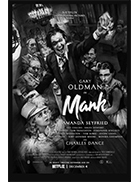Mank
|  The irony should not be lost on the fact that David Fincher’s Mank, a dramatized feature about the writing of one of Orson Welles’s greatest films, Citizen Kane (1941), is being released by the streaming giant Netflix. It was Netflix, after all, that two years ago put its considerable money and muscle where others had tried and failed for decades to rescue from legal oblivion, finish, and release Welles’s long-shelved feature The Other Side of the Wind, thus adding another notch in the great filmmaker’s complex legacy. And now, with Mank, they have released a film that is nothing if not obsessed with minimizing Welles’s contribution to the film for which he is best known, a misguided project of historical revisionism that has been stewing at least since the publication of Pauline Kael’s now largely discredited book-length 1971 New Yorker essay “Raising Kane,” in which she argued that Welles had virtually no involvement in the writing of Kane and that all the credit should go to his co-writer, Herman “Mank” Mankiewicz. Now, it is true that Mankiewicz has become something of a forgotten figure in Hollywood history, sharing an unenviable space with scores of talented screenwriters who have supplied great pleasure for millions of moviegoers, but whose names would be said to be forgotten if anyone had ever known them in the first place (as Frank Capra put it, “Scriptwriting is the toughest part of the whole racket … the least understood and the least noticed”). So, the idea of making a film that shines a light on one of classical Hollywood’s brightest wits who lived and wrote through some of the biggest upheavals in the industry, including the shift to synchronized sound, the implementation of the Production Code, the Great Depression, and World War II, is an admirable project. It is just too bad that it had to come at the expense of Welles, who is largely absent from the film and, when he does appear, is depicted as a cartoonish blowhard who one character calls nothing more than a “showman.” Based on a script written more than 20 years ago by Jack Fincher, the director’s late father, Mank splits its narrative between the intense two-month period in the spring of 1940 during which Mank (Gary Oldman) wrote an early draft of Citizen Kane and the early 1930s, when he regularly mixed and traded barbs with some of the industry’s titans, including MGM head Louis B. Mayer (Arliss Howard), Mayer’s righthand man Irving Thalberg (Ferdinand Kingsley), producer David O. Selznick (Toby Leonard Moore), and, most importantly, media magnate William Randolph Hearst (Charles Dance) and his much younger mistress, Marion Davies (Amanda Seyfried), both of whom would become models for characters in Citizen Kane. A significant chunk of the narrative has nothing to do with Kane, but rather involves California’s 1934 gubernatorial election, which pitted the socialist crusader and writer Upton Sinclair against Republican Frank Merriam, who had the backing of the Hollywood moguls. A lesson in past-is-prologue, the election hinged on a calculated disinformation campaign involving fabricated newsreels that the film suggests were Mank’s off-handed idea and for which he felt responsible, which possibly explains why he would turn Citizen Kane into a barely disguised and highly unflattering portrait of Hearst. The rest of the film is set at Mrs. Campbell’s Guest Ranch in Victorville, California, on the edge of the Mojave Desert an hour and a half outside of Los Angeles, where Mank is sent by Welles and overseen by his partner, the producer and actor John Houseman (Sam Troughton), to write the initial draft of Kane. Hobbled with a broken leg from a recent auto accident, Mank spends most of his time in bed dictating to his assistant, Rita Alexander (Lily Collins), and eventually taking meetings with various people, including his filmmaker brother Joseph (Tom Pelphrey), who try to convince him not to complete the script because it will incense the powerful Hearst. Mank is undeterred, and if there is a through line for his character, it is that he cares nothing for what others think about him. A notorious alcoholic and acerbic raconteur who both charmed and clashed with everyone around him, including his long-suffering wife Sara (Tuppence Middleton), Mank is presented as both hero and villain, a man of great talent who was unafraid to speak his mind, but often fell prey to the twin demons of drink and gambling, both of which tend to undercut his best efforts. Oldman plays him as best he can, but part of the film’s problem is that Mank is a wit in search of a character; everything he says feels written, and while it is true that he had a way with words in the moment, almost every line of Oldman’s dialogue is so clever, sharp, or piercing that he feels almost superhuman. No wonder everyone marvels at the supposed brilliance of his script. As with any David Fincher film, Mank is technically superb, with gorgeous production design that brings us right into the rarefied world of studio-era Hollywood, from various backlots to Hearst’s magnificent San Simeon (the ranch resot where Mank does all his writing is the actual location, which has changed very little since that time). The film’s aesthetic approach feels oddly compromised by a clear desire to emulate Gregg Toland’s sharp, high-contrast, black-and-white cinematography on Citizen Kane, but without fully committing to the approach (cinematographer Erik Messerschmidt is a relative newcomer, having worked primarily on short films and television series, including Fincer’s Mindhunter). The film regularly employs shallow focus, for example, while Kane is best known for its consistent use of deep focus, and the choice of the wide CinemaScope aspect ratio feels out of place for a film trying to recreate the look of something made in the 1940s when all films were framed in the Academy aspect ratio. The sound mix, on the other hand, was done entirely in monaural to replicate the single-channel soundscape of films of that era. If Fincher had fully committed to the era’s aesthetics, as Robert Eggers did in The Lighthouse (2019), for example, the effect might have been more compelling. Which, of course, brings us back to the historical issues at hand, namely the film’s crediting Mank with Kane’s script and presenting Welles (Tom Burke) as a blowhard credit stealer. As Mank himself puts it at one point, “If you keep telling people something untrue, loud and long enough, they’re apt to believe it,” a statement that feels depressingly appropriate for the Trump era and unfortunately applies to the film’s own perpetuation of Kael’s historically uninformed argument about Citizen Kane’s true authorship. The problem is that the film’s chronicling of Citizen Kane’s writing process leaves out a lot, giving the impression that Mank toiled alone on the script and Welles had virtually no involvement (the film ends, in fact, with a press conference following Mank’s winning the Oscar for Best Screenplay in which he says he would like to accept it in the same manner as he wrote the script: without Welles). This is simply not the case, as film historian Robert Carringer put the issue to rest back in 1978 in his essay “The Scripts of Citizen Kane,” which was based on his study of seven drafts of the script, including Mank’s initial draft (Kael’s essay, by way of comparison, was based on a single draft and anecdotes from various people involved in the production). To quote Carringer at length: So, in other words, while the film is accurate in depicting Mank’s process of writing the first draft of the screenplay with little input from Welles (Welles, in fact, was writing a parallel draft on his own at that time), it is decidedly dishonest in suggesting that he did that work completely on his own and that this draft was essentially what became Citizen Kane. Fincher’s film is too taken with the romanticized idea of the lone writer churning out a masterpiece of prose through a haze of alcohol and interpersonal conflict, which produces a supreme and disconcerting irony: For a film that wants to rescue a forgotten screenwriter from the ashbin of history and celebrate the creative process of screenwriting, it is woefully simplistic in its view of the writing process itself and how words on a page eventually becomes images on a screen. Copyright © 2020 James Kendrick Thoughts? E-mail James Kendrick All images copyright © Netflix |
Overall Rating: 

 (2.5)
(2.5)


